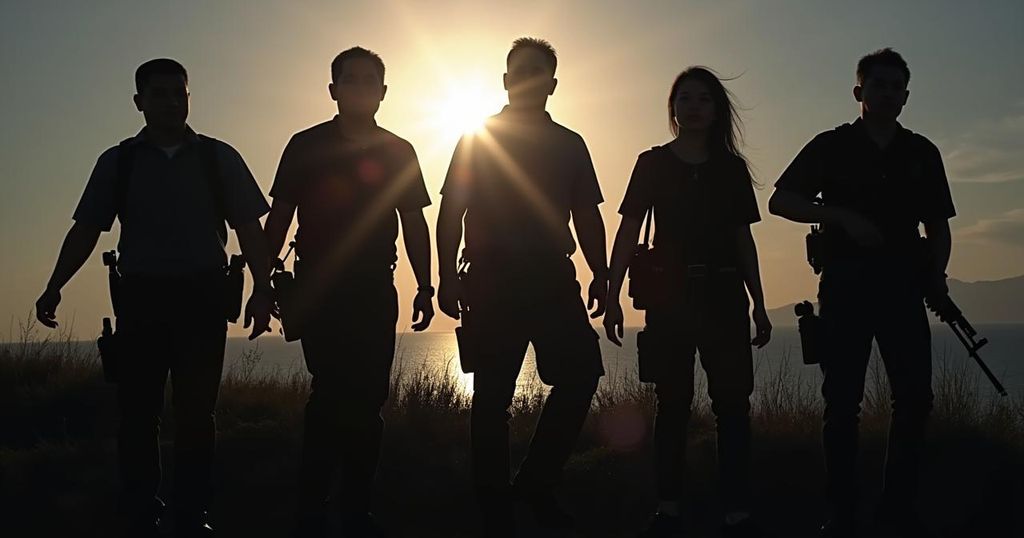Philippines Intensifies Crackdown on Duterte-Linked Fugitives Amid Political Shift

In September 2024, the Philippine government made significant strides in apprehending high-profile fugitives linked to the Duterte administration, coinciding with a breakdown in political ties between President Ferdinand Marcos Jr. and former President Rodrigo Duterte. Key arrests included individuals involved in serious criminal activities and corruption, signaling a shift towards accountability in governance. Although the arrests were met with some criticism regarding operational execution, they illustrate a commitment to restoring law and order and reforming past policies.
In September 2024, the Philippine government intensified efforts to apprehend prominent fugitives, some of whom lingered outside the reach of law enforcement following the conclusion of the Duterte administration. An impressive six high-profile suspects were captured in just three weeks, a development attributed largely to the fraying alliance between President Ferdinand Marcos Jr. and former President Rodrigo Duterte, as well as Vice-President Sara Duterte. Political analysts interpreted this as a strategic move by President Marcos, signaling a shift towards distancing his administration from the previous regime’s controversial policies. Key arrests included former Davao City mayor Alice Guo, alleged to have connections with a criminal syndicate exploiting online casinos, who was captured shortly after being deported from Indonesia. The police also apprehended Apollo Quiboloy, former spiritual adviser to Duterte, who faces serious charges including human trafficking and sexual abuse. Additionally, former budget undersecretary Lloyd Christopher Lao was arrested for his alleged role in corrupt procurement deals during the pandemic, and businessperson Tony Yang was also detained due to his suspected involvement in criminal activities linked to Guo. Further arrests encompassed individuals such as former Palawan governor Joel Reyes, implicated in the murder of journalist Gerry Ortega, as well as others involved in the kidnapping of a beauty contestant who has been missing since October 2023. Observers noted that the Marcos administration had been reluctant to target Duterte associates until their political ties deteriorated. Dr. Carmel Abao, chair of the political science department at Ateneo de Manila University, remarked on this transition: “I look at it as Marcos being on the offensive against the Dutertes. He’s doing this to project an image, saying: ‘We’re the good guys. We’re nice, but we also get things done.’” Such efforts reflect the government’s attempts to project a commitment to law and order and reinforce its legitimacy following the tumultuous ties with the Dutertes. Despite the commendable strides in law enforcement, some criticisms emerged regarding the operations executed in these arrests, with calls for improvements to security and intelligence frameworks to prevent lapses in future actions. Authorities pledged ongoing reforms to enhance their operational capabilities and ensure accountability as they face the challenges posed by politically sensitive cases.
In recent years, the political landscape in the Philippines has witnessed significant changes, particularly following the administration of Rodrigo Duterte, whose controversial policies were often associated with increased violence and alleged human rights abuses. Following Ferdinand Marcos Jr.’s ascent to the presidency in 2022, there was an initial expectation of continuity of Duterte’s legacy due to their political alliance. However, the dissolution of this collaboration has prompted renewed law enforcement action against high-profile fugitives tied to former government figures. The arrests made in September 2024 showcase a pivotal shift in the government’s approach, reflecting a complex interplay of politics and law enforcement.
The string of arrests in September symbolizes a crucial transition in Philippine politics, marked by the waning influence of the Duterte dynasty and the Marcos administration’s attempt to establish a firmer stance against corruption and impunity. Analysts suggest that the government’s success in these operations is not merely a reflection of improved law enforcement but also a strategic rebranding effort to distance itself from its predecessor’s controversial practices. The emphasis on legal accountability and reforms in operational standards will determine the effectiveness of these initiatives moving forward, as the Marcos government navigates the legacies of the past while asserting its authority.
Original Source: asianews.network








